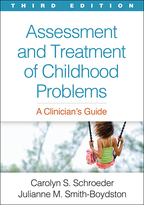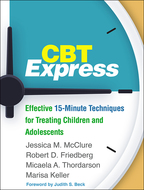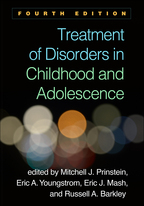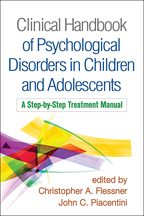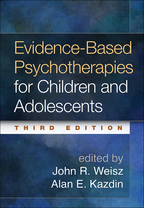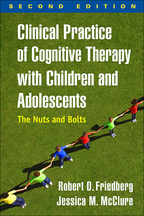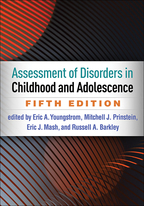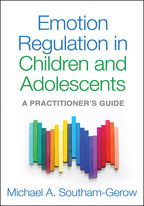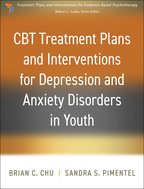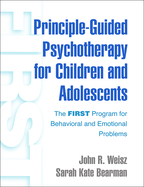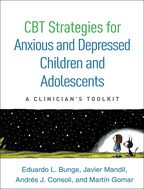Assessment and Treatment of Childhood Problems
Third Edition
A Clinician's Guide
Carolyn S. Schroeder and Julianne M. Smith-Boydston
Paperbacke-bookprint + e-book
Paperback
orderNovember 29, 2020
ISBN 9781462545957
Price: $53.00648 Pages
Size: 7" x 10"
Copyright Date: 2017
The reproducible materials can be downloaded and printed in PDF format.
“One of the best written books on assessment and treatment of childhood problems. I highly value and recommend this book, as this is one of the year's best contributions to our field.”

—Doody's Electronic Journal (on the second edition)
“A remarkable and comprehensive update of a classic book. This is an essential text for all child mental health professionals in training, as well as practicing clinicians who want to keep up to date with evidence-based assessment and treatment of all the key psychological and behavioral problems that are likely to emerge in practice with children. Especially useful are the downloadable assessment instruments and clinical forms, the measure descriptions (in an appendix), and the listings of clinician and parent resources at the end of each chapter. The many case examples help to make the material understandable and practical. This book is a gem!”

—Annette M. La Greca, PhD, ABPP, Distinguished Professor of Psychology and Pediatrics, University of Miami
“The prior editions have been my go-to references for teaching and clinical practice for the past two decades, and the third edition will have a prominent place on my shelf. This book is rich with useful, step-by-step guidance for clinical practice. It is organized around common presenting problems (updated for DSM-5), and follows a consistent framework of assessment and intervention, making it an excellent tool for teaching developing clinicians. Clinical conceptualizations are grounded in a robust theoretical framework, and therapeutic approaches are informed by current evidence-based practice. I highly recommend this book for any clinician interested in working with children and adolescents, and consider it essential for practice with pediatric populations in an integrated multidisciplinary setting.”

—Parinda Khatri, PhD, Chief Clinical Officer, Cherokee Health Systems, Knoxville, Tennessee
“I found the second edition of this book to be very effective as a basic text for a statewide training program for supervisors of child protective workers. The third edition also would be a good fit for MSW practice courses in the child welfare, clinical practice, mental health, health care, and/or school social work specializations, or for advanced practice courses in BSW programs. The text is very well grounded in research-based practice, reads well, and is highly congruent with the everyday needs of the practitioner. I am particularly impressed with the authors' ability to connect research evidence to specific practice guidelines and directives.”

—Charles D. Cowger, PhD, Professor Emeritus, University of Missouri School of Social Work and University of Illinois School of Social Work
“This masterful book combines practical diagnostic and therapeutic guidance with validated tools and rating scales. It provides a basis for coordinated, collaborative care among mental health professionals, primary care providers, and families. I like the pragmatic sequence from common developmental problems to more severe psychological conditions, and the coverage of contemporary issues of sexuality, social determinants of health, toxic childhood experiences, and nontraditional family models. I also appreciate the emphasis on prevention, resilience, and early intervention. This book will be indispensable in my clinical practice as a pediatrician.”

—Jennifer Lail, MD, FAAP, James M. Anderson Center for Health Systems Excellence, Cincinnati Children's Hospital Medical Center
“This is a wonderful book for teaching best practices for working with children to master’s-and doctoral-level students. The authors have thoughtfully organized the material across the text and within each chapter, providing a comprehensive resource that is ideal for teaching students how to address mental and behavioral health needs of children using evidence-based approaches. The applied nature of the book allows students to build confidence in foundational and specialty skills for working with children presenting with a range of concerns. The examples, templates, and tools make this a great resource that students can use throughout their careers.”

—Sonia Rubens, PhD, Department of Counseling Psychology, Santa Clara University
—Doody's Electronic Journal (on the second edition)
“A remarkable and comprehensive update of a classic book. This is an essential text for all child mental health professionals in training, as well as practicing clinicians who want to keep up to date with evidence-based assessment and treatment of all the key psychological and behavioral problems that are likely to emerge in practice with children. Especially useful are the downloadable assessment instruments and clinical forms, the measure descriptions (in an appendix), and the listings of clinician and parent resources at the end of each chapter. The many case examples help to make the material understandable and practical. This book is a gem!”
—Annette M. La Greca, PhD, ABPP, Distinguished Professor of Psychology and Pediatrics, University of Miami
“The prior editions have been my go-to references for teaching and clinical practice for the past two decades, and the third edition will have a prominent place on my shelf. This book is rich with useful, step-by-step guidance for clinical practice. It is organized around common presenting problems (updated for DSM-5), and follows a consistent framework of assessment and intervention, making it an excellent tool for teaching developing clinicians. Clinical conceptualizations are grounded in a robust theoretical framework, and therapeutic approaches are informed by current evidence-based practice. I highly recommend this book for any clinician interested in working with children and adolescents, and consider it essential for practice with pediatric populations in an integrated multidisciplinary setting.”
—Parinda Khatri, PhD, Chief Clinical Officer, Cherokee Health Systems, Knoxville, Tennessee
“I found the second edition of this book to be very effective as a basic text for a statewide training program for supervisors of child protective workers. The third edition also would be a good fit for MSW practice courses in the child welfare, clinical practice, mental health, health care, and/or school social work specializations, or for advanced practice courses in BSW programs. The text is very well grounded in research-based practice, reads well, and is highly congruent with the everyday needs of the practitioner. I am particularly impressed with the authors' ability to connect research evidence to specific practice guidelines and directives.”
—Charles D. Cowger, PhD, Professor Emeritus, University of Missouri School of Social Work and University of Illinois School of Social Work
“This masterful book combines practical diagnostic and therapeutic guidance with validated tools and rating scales. It provides a basis for coordinated, collaborative care among mental health professionals, primary care providers, and families. I like the pragmatic sequence from common developmental problems to more severe psychological conditions, and the coverage of contemporary issues of sexuality, social determinants of health, toxic childhood experiences, and nontraditional family models. I also appreciate the emphasis on prevention, resilience, and early intervention. This book will be indispensable in my clinical practice as a pediatrician.”
—Jennifer Lail, MD, FAAP, James M. Anderson Center for Health Systems Excellence, Cincinnati Children's Hospital Medical Center
“This is a wonderful book for teaching best practices for working with children to master’s-and doctoral-level students. The authors have thoughtfully organized the material across the text and within each chapter, providing a comprehensive resource that is ideal for teaching students how to address mental and behavioral health needs of children using evidence-based approaches. The applied nature of the book allows students to build confidence in foundational and specialty skills for working with children presenting with a range of concerns. The examples, templates, and tools make this a great resource that students can use throughout their careers.”
—Sonia Rubens, PhD, Department of Counseling Psychology, Santa Clara University

